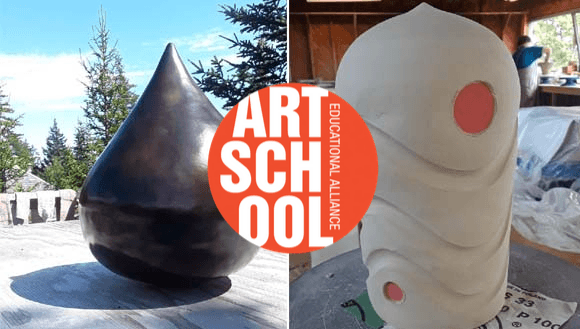Evan Hagan, EA Art School’s Studio Manager, was accepted into a prestigious program to spend two weeks in an intensive ceramics workshop at Haystack Mountain School of Crafts. He shared his experience below:
Can you tell us about Haystack Mountain School of Crafts?
Haystack Mountain Craft School is in Deer Island, Maine. It’s been there since 1950. It started out as a small craft school in a different part of Maine that was started by Mary Beasom Bishop, so that people could have advanced training in certain craft skills that are not usually a part of a collegiate art program, and they had the idea that it would always be sort of like a transitory experience. There’s no set staff and new teachers come in every two weeks. They never have the same teachers come back usually, like summer to summer, so it’s kind of like a revolving door of really great artists and craftspeople from all over the world, and a lot of people come out to study under them.
The campus is beautiful too, it’s on a tiny island in Maine sitting on the Atlantic Ocean and the whole camp is just sort of perched on stilts going down this steep hill to the ocean.
Can you tell us about your experience?
I went out there for two weeks to study South African vessel-making and hand-building techniques with two South African artists named Madota Fani and Andile Dyalvane. They both have very robust coil construction as the backbone for their vessel-building. They basically take ropes of clay and squeeze them out and kind of weave them together to create these very large forms in a very short amount of time—it’s very impressive. I was out there to expand my hand-building practices so I, too can build things very large and very fast now.
There were 18 people doing the workshop, and we were all in the studio like 12 hours a day for two weeks, and just building a lot of very big stuff. It was cool.
What were your favorite things about it?
Mostly the community. It was really nice to be able to have a nice technical discussion about the material and be able to learn from a person like Andile who has been a working potter for 25 years. He’s been through some very impressive residencies. He had just finished a residency at the Leach Pottery–I believe that’s in Cornwall, England— which is sort of like Mecca if you’re a studio potter. Bernard Leach was kind of a huge deal and he still is, so it was interesting to talk to Andile after he’d just come from the Leach Pottery, about his experience there. He’s just a super interesting guy, and he created a sense of community in the workshop and we all felt very close by the end of it. And you know, learning these hand-building techniques too, that was really exciting for me.
There were a lot of different workshops going on all the time; they had a metalsmithing workshop, a woodworking workshop, and a fibers workshop. They also had a glass-blowing workshop and I made friends with a lot of the glassblowers out there. I thought there was a lot of really interesting overlap between their process and what ceramics does—for example, coating our vessels in a glass surface to protect it so it’s safe to eat off of and decorative. I really liked talking to them about that overlap between glass and ceramics. It was nice to just like talk to people about art, and bounce other ideas off each other and learn where that overlap of interest and experience sort of line up.
Is there anything else that you would like to share?
Yeah, it was a really transformative experience for me. I feel reinvigorated, professionally and also artistically–I feel like I have a lot of ideas that I’m still trying to work through and process. I feel like, coming out of it, I have a different perspective on the material I work with and what I want my work to look like.
How would you like to incorporate the thing you learned into your own classes?
I think that the techniques I’ve learned will be most applicable to my classes, because I’m more of a wheel-thrown guy in my own practices, but a lot of my students are gravitating more toward hand-building and I feel like I’m better equipped to serve them to a higher degree and give them more feedback on how to increase their craftsmanship, and build larger, if they’re interested in doing so. I’m really excited to share that knowledge with my students.
Register now to take Evan’s class this Fall and learn these techniques yourself!










